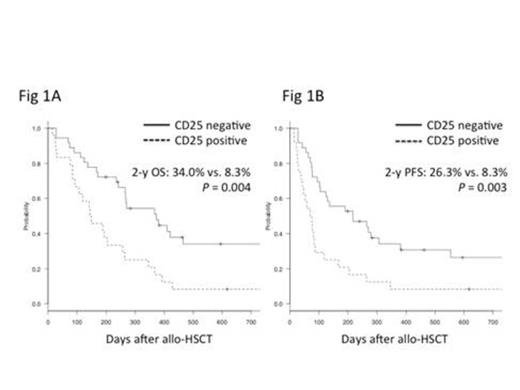Abstract
Introduction: We have recently reported that the evaluation CD25 expression on leukemic blasts at the time of disease onset could be an alternative non-molecular tool for predicting transplant outcomes in patients with cytogenetically intermediate acute myeloid leukemia (AML). We herein focus on patients with refractory or relapsed AML and examine the clinical correlation of the surface CD25 expression measured by flow cytometry at the time of transplantation and subsequent transplant outcomes.
Patients and methods: A total of 60 AML samples with primary induction failure (n = 32), first relapse (n = 23) or second relapse (n = 5) were analyzed by means of flow cytometric CD25 antigen expression on leukemic blasts at the time of transplantation. Survival outcomes were compared with regard to the CD25 expression. Overall survival (OS) and progression-free survival (PFS) were estimated by Kaplan-Meiyer. Factors associated with at least borderline significance (p< 0.10) on univariate analyses were subjected to multivariate analysis using backward stepwise proportional hazard modeling. Multivariate analysis was performed using the Cox proportional hazards regression model.
Results: CD25 antigen expression (>10%) on leukemic blasts was observed in 24 patients (40%). There was no significant difference between CD25 positive and negative groups in terms of clinical characteristics including cytogenetic risk, WHO classification, marrow or peripheral blasts % at transplantation, comorbidity, conditioning regimen, donor source or interval between diagnosis and transplantation. Although more early relapse cases within 180 days were observed in the CD25 positive group (p = 0.01), cumulative incidence of relapse, non-relapse mortality, acute or chronic graft-versus-host disease were not different between 2 groups. However, there was a significant difference in OS or PFS between 2 groups: 2-years OS; 8.3% vs. 34.0%, p=0.004 (Fig 1A), 2-years PFS; 8.3% vs. 26.3%, p=0.003 (Fig 1B). Moreover, multivariate analysis showed that CD25 expression was an independent adverse factor for OS (hazard ratio: 2.01, 95% confidence interval: 1.10-3.67, p = 0.02).
Conclusion: Our cohorts with total 60 patients with refractory or relapsed AML showed that CD25 endowed these patients with an adverse prognostic impact, which might not be overcome even by transplantation. AML patients with residual CD25+ blasts at the time of transplantation might require additional therapy before or after transplantation for better survival. However, our small experience clearly desires larger series patients for evaluating the real impact of CD25 expression.
No relevant conflicts of interest to declare.
Author notes
Asterisk with author names denotes non-ASH members.


This feature is available to Subscribers Only
Sign In or Create an Account Close Modal